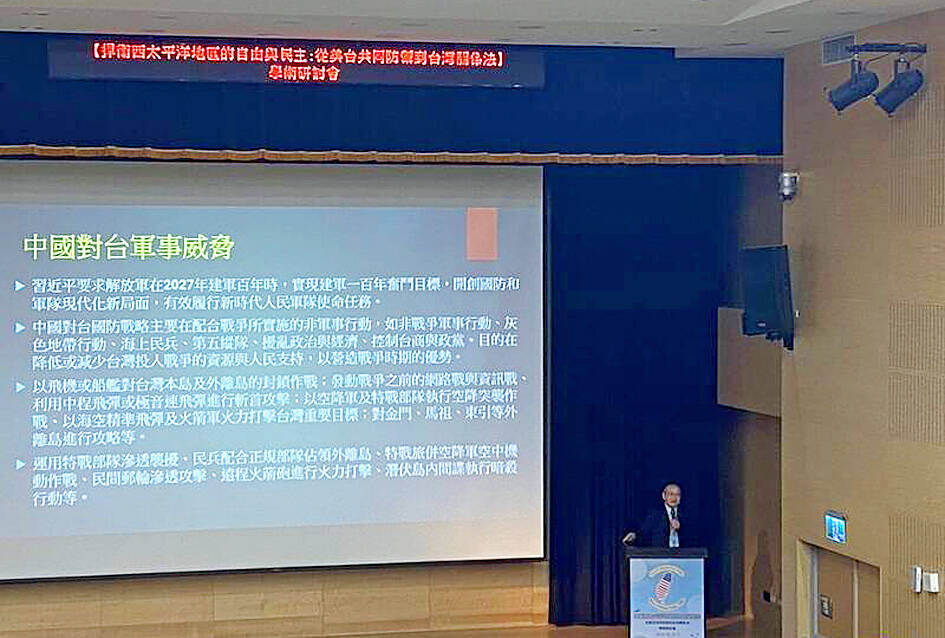The US “is very likely” to adopt an “alliance” position to assist in defending Taiwan in the event of a cross-strait military conflict, an academic from the Institute for National Defense and Security Research told a forum in Taipei yesterday, calling on the government to enhance the nation’s preparedness.
Shen Ming-shih (沈明室), director of the institute’s Division of National Security Research, made the remarks at a forum hosted by the Taiwan Association of University Professors.
Discussion topics ranged from Taiwan-US joint defense to the US Taiwan Relations Act to a remark by US Indo-Pacific Commander Admiral John Aquilino in March that China would be ready to invade Taiwan by 2027.

Photo: Huang Chin-hsuan, Taipei Times
The US has been assisting Taiwan to buttress its self-defense through a “quasi-alliance” position, in which it provides arm sales, military financing and training for Taiwan based on the Taiwan Relations Act, Shen said.
Considering Taiwan’s strategic value, the US would be willing to support Taiwan militarily, similarly to how NATO assists Ukraine — a nonmember country — amid Russia’s invasion for geostrategic concerns, he said.
If a cross-strait conflict breaks out, the quasi-alliance position adopted by the US would “very likely” elevate to an alliance stance that includes Japan, although they have not yet established diplomatic relations and defense protocols with Taiwan, Shen said.
The US could interfere in a conflict between Taiwan and China in three different ways: providing weapons and intelligence without dispatching troops, offering sea and air armed assistance, or dispatching ground forces to Taiwan, he said.
The Taiwanese government should prepare for such military cooperation with the US, especially the coordination of joint operations and integration of command-and-control systems, he said, adding that the military should complete relevant training and logistics planning to enhance defense capabilities.
Once a cross-strait war erupts, time pressures would be no less than during the 1958 Taiwan Strait Crisis in the hours after Kinmen County was shelled, said Huang Chung-ting (黃宗鼎), associate research fellow from the institute’s Division of Chinese Politics, Military and Warfighting Concepts.
The White House would need time to verify the invasion and make a decision for the US Congress to review and approve, he said, adding that the period would be critical to Taiwan’s security in a conflict scenario.
Taiwan should make legal preparations by signing a reciprocal access or visiting forces agreement that allows US troops to be temporarily stationed in Taiwan, or even by signing a status of forces agreement that enables the long-term stay of forces or an agreement allowing the US to use military bases, if the US substantively considers providing armed assistance for Taiwan, Huang said.
Regarding the US’ long-held position of “strategic ambiguity” toward Taiwan, he said it was intended to disrupt Beijing’s judgement about the situation, but it could also fuel the “US skepticism theory” in Taiwan.
Additional reporting by CNA

An essay competition jointly organized by a local writing society and a publisher affiliated with the Chinese Communist Party (CCP) might have contravened the Act Governing Relations Between the People of the Taiwan Area and the Mainland Area (臺灣地區與大陸地區人民關係條例), the Mainland Affairs Council (MAC) said on Thursday. “In this case, the partner organization is clearly an agency under the CCP’s Fujian Provincial Committee,” MAC Deputy Minister and spokesperson Liang Wen-chieh (梁文傑) said at a news briefing in Taipei. “It also involves bringing Taiwanese students to China with all-expenses-paid arrangements to attend award ceremonies and camps,” Liang said. Those two “characteristics” are typically sufficient

A magnitude 5.9 earthquake that struck about 33km off the coast of Hualien City was the "main shock" in a series of quakes in the area, with aftershocks expected over the next three days, the Central Weather Administration (CWA) said yesterday. Prior to the magnitude 5.9 quake shaking most of Taiwan at 6:53pm yesterday, six other earthquakes stronger than a magnitude of 4, starting with a magnitude 5.5 quake at 6:09pm, occurred in the area. CWA Seismological Center Director Wu Chien-fu (吳健富) confirmed that the quakes were all part of the same series and that the magnitude 5.5 temblor was

The brilliant blue waters, thick foliage and bucolic atmosphere on this seemingly idyllic archipelago deep in the Pacific Ocean belie the key role it now plays in a titanic geopolitical struggle. Palau is again on the front line as China, and the US and its allies prepare their forces in an intensifying contest for control over the Asia-Pacific region. The democratic nation of just 17,000 people hosts US-controlled airstrips and soon-to-be-completed radar installations that the US military describes as “critical” to monitoring vast swathes of water and airspace. It is also a key piece of the second island chain, a string of

The Central Weather Administration has issued a heat alert for southeastern Taiwan, warning of temperatures as high as 36°C today, while alerting some coastal areas of strong winds later in the day. Kaohsiung’s Neimen District (內門) and Pingtung County’s Neipu Township (內埔) are under an orange heat alert, which warns of temperatures as high as 36°C for three consecutive days, the CWA said, citing southwest winds. The heat would also extend to Tainan’s Nansi (楠西) and Yujing (玉井) districts, as well as Pingtung’s Gaoshu (高樹), Yanpu (鹽埔) and Majia (瑪家) townships, it said, forecasting highs of up to 36°C in those areas